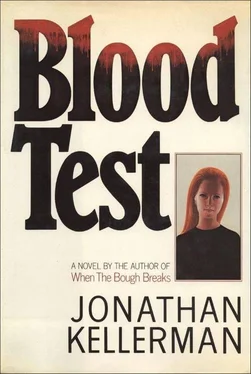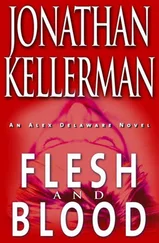Jonathan Kellerman - Blood Test
Здесь есть возможность читать онлайн «Jonathan Kellerman - Blood Test» весь текст электронной книги совершенно бесплатно (целиком полную версию без сокращений). В некоторых случаях можно слушать аудио, скачать через торрент в формате fb2 и присутствует краткое содержание. Город: New York, Год выпуска: 1986, ISBN: 1986, Издательство: Atheneum, Жанр: Триллер, на английском языке. Описание произведения, (предисловие) а так же отзывы посетителей доступны на портале библиотеки ЛибКат.
- Название:Blood Test
- Автор:
- Издательство:Atheneum
- Жанр:
- Год:1986
- Город:New York
- ISBN:978-0689116346
- Рейтинг книги:4 / 5. Голосов: 1
-
Избранное:Добавить в избранное
- Отзывы:
-
Ваша оценка:
- 80
- 1
- 2
- 3
- 4
- 5
Blood Test: краткое содержание, описание и аннотация
Предлагаем к чтению аннотацию, описание, краткое содержание или предисловие (зависит от того, что написал сам автор книги «Blood Test»). Если вы не нашли необходимую информацию о книге — напишите в комментариях, мы постараемся отыскать её.
Blood Test — читать онлайн бесплатно полную книгу (весь текст) целиком
Ниже представлен текст книги, разбитый по страницам. Система сохранения места последней прочитанной страницы, позволяет с удобством читать онлайн бесплатно книгу «Blood Test», без необходимости каждый раз заново искать на чём Вы остановились. Поставьте закладку, и сможете в любой момент перейти на страницу, на которой закончили чтение.
Интервал:
Закладка:
“What in the world possessed you to conduct a one-man invasion of this place?” I asked him.
“I know they’re in there,” he panted. “Behind those gates. I can feel it!”
“You turned the Volvo into an assault tank because of feelings? Remember when you called intuition ‘just another form of soft-headed hocus-pocus’?”
“This is different. They wouldn’t let me in. If that’s not proof they’re hiding something I don’t know what it is!” He punched his palm with his fist. “I’ll get in there somehow and tear that place apart until I find him.”
“That’s crazy. What is it about the Swopes that’s turned you into a damned cowboy?”
He covered his face with his hands.
I sat down next to him and put my arm around his shoulder. He was soaked with sweat.
“Come on, let’s get out of here,” I urged.
“Alex,” he said hoarsely, his breath sour and strong, “oncology is a specialty for those who are willing to learn how to lose graciously. Not to love failure or accept it, but to suffer with dignity, as a patient must. Did you know that I was first in my medical school class?”
“I’m not surprised.”
“I had my pick of residencies. Many oncologists are the cream of medicine. And yet we confront failure each day of our lives.”
He pushed himself up and walked to the bars, running his hands up and down the ragged and rusty cylinders.
“Failure,” he repeated. “But the victories are uncommonly sweet. The salvage and reconstruction of a life. What could create greater illusions of omnipotence, eh, Alex?”
“There’ll be many more victories,” I assured him. “You know that better than anyone. Remember the speech you used to give at fund raisers — the slide show with all those pictures of cured kids? Let this one go.”
He swiveled around and faced me, eyes blazing.
“As far as I’m concerned that boy is alive. Until I see his corpse I won’t believe otherwise.”
I tried to speak but he cut me off.
“I didn’t go into this field because of mawkish sentimentality — no favorite cousin died of leukemia, no grandpapa wasted away of carcinoma. I became an oncologist because medicine is the science — and the art — of fighting death. And cancer is death. From the first time, as a medical student, when I viewed those monstrous, primitive, evil cells under the microscope, I was seized with that truism. And I knew what my life’s work would be.”
Beads of perspiration had collected on his high dark forehead. The coffee bean eyes glistened and roamed the cell.
“I won’t give up,” he said, radiating defiance. “Only the conquest of death, my friend, allows a glimpse of immortality. ”
He was unreachable, caught up in his own frantic vision of the world. Obsessive and quixotic and denying what was most probable: Woody and Nona were dead, buried somewhere in the shifting mulch beneath the city.
“Let the police handle it, Raoul. My friend’s due to come down here soon. He’ll check everything out.”
“The police,” he spat. “A lot of good they’ve been. Bureaucratic pencil pushers. Mediocre minds of limited vision. Like that stupid cowboy out there. Why aren’t they here right now — every day is crucial for that little boy. They don’t care, Alex. To them he’s just another statistic. But not to me!”
He folded his arms in front of him, as if warding off the indignity of confinement, unaware of his derelict appearance.
I’d long thought that a surfeit of sensitivity could be a killing thing, too much insight malignant in its own right. The best survivors — there are studies that show it — are those blessed with an inordinate ability to deny. And keep on marching.
Raoul would march till he dropped.
I’d always considered him a touch manic. Perhaps as manic at the core as Richard Moody, but more generously endowed intellectually so that the excess energy was channeled honorably. For the good of society.
Now, too many failures had converged upon him: the Swopes’ rejection of treatment, which, because he lived his work, was seen as a rejection of him , an atheism of the worst sort. The abduction of his patient — humiliation and loss of control. And now, death, the ultimate insult.
Failure had made him irrational.
I couldn’t leave him there but didn’t know how to get him out.
Before either of us could speak, the sound of approaching footsteps punctuated the silence. Houten peered into the cell, keys in hand.
“Ready, gentlemen?”
“I’ve had no luck, Sheriff.”
The news deepened the worry lines around his eyes.
“You’re choosing to stay with us, Dr. Melendez-Lynch?”
“Until I’ve found my patient.”
“Your patient isn’t here.”
“I don’t believe that.”
Houten’s mouth tightened and his eyebrows lowered. “I’d like you out of there, Dr. Delaware.”
He turned a key, held the door barely open and kept a watchful eye on Raoul as I slipped through.
“Good-bye, Alex,” said the oncologist with a martyr’s solemnity.
Houten spoke to him in clipped cadence.
“If you think prison is fun, sir, you’re going to learn different. I promise you that. In the meantime, I’m getting you a lawyer.”
“I refuse legal services.”
“I’m getting you one anyway, Doctor. Whatever happens to you is going to be by the book.”
He turned on his heel and stomped away.
As we left the jail I caught a last glimpse of Raoul behind the bars. There wasn’t any good reason for me to feel unfaithful, but I did.
16
Houten made a phone call out of earshot. Ten minutes later a man in shirtsleeves showed up and the sheriff came forward to greet him.
“Thanks for coming on such short notice, Ezra.”
“Pleased to help, Sheriff.” The man’s voice was soft, modulated, and even.
He looked to be in his late forties, medium-sized but sparely built, with a scholar’s stoop. Everything about him was compact and neat. The smallish head was covered with thin salt-and-pepper hair combed straight back. The ears were elfin and close set. His facial features were regular but too delicate to be handsome. His short-sleeved white shirt was spotless and, despite the heat, free of wrinkles. His khaki trousers seemed freshly laundered. He wore rimless octagonal eyeglasses and carried a clip-on case for them in his breast pocket.
He looked like a man who never perspired.
I stood up and he appraised me mildly.
“Ezra,” said Houten, “this is Dr. Delaware, a psychologist from Los Angeles. Came all the way down to take back the one I told you about. Doctor, meet Mr. Ezra Maimon, the best lawyer in town.”
The neat man laughed gently.
“The Sheriff’s engaging in a bit of hyperbole,” he said and held out a thin callused hand. “I’m the only attorney in La Vista, and the cases I usually work with are made of wood.”
“Ezra owns a rare fruit nursery just out of town,” explained Houten. “Claims he’s retired but we still get him to do a bit of lawyering from time to time.”
“Wills and small estates are comparatively simple matters,” said Maimon. “If this turns into criminal defense you’ll have to bring in a specialist.”
“That’s all right,” Houten twirled one of his mustaches. “This is no criminal case. Yet. Just a little problem, like I told you over the phone.”
Maimon nodded.
“Tell me the details,” he said.
He listened quietly and impassively, turning once or twice to smile at me. When Houten was through, the attorney placed a finger to his lips and gazed up at the ceiling, as if doing mental arithmetic. After a minute of silent contemplation he said, “Let me see my client.”
Читать дальшеИнтервал:
Закладка:
Похожие книги на «Blood Test»
Представляем Вашему вниманию похожие книги на «Blood Test» списком для выбора. Мы отобрали схожую по названию и смыслу литературу в надежде предоставить читателям больше вариантов отыскать новые, интересные, ещё непрочитанные произведения.
Обсуждение, отзывы о книге «Blood Test» и просто собственные мнения читателей. Оставьте ваши комментарии, напишите, что Вы думаете о произведении, его смысле или главных героях. Укажите что конкретно понравилось, а что нет, и почему Вы так считаете.












